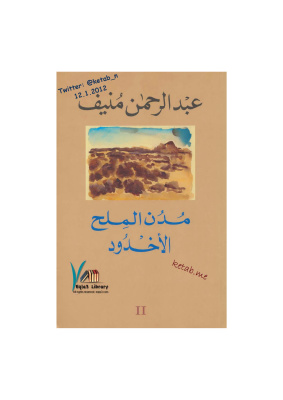Amman, Jordan: Al-Mu'assasat ul-'Arabiyat Ad-Dirasat wa-n-Nashr,
2005. — 608 p. (in Arabic)
Abdel Rahman Munif (1933 –2004) is a Saudi novelist. His novels
include strong political elements as well as mockeries of the
Middle Easte elite classes. His work so offended the rulers of
Saudi Arabia that many of his books were banned and his Saudi
citizenship revoked.
"Cities of Salt" is the main novel by him. It was first published in Beirut in 1984 and was immediately recognized as a major work of Arab literature. It was translated into English by Peter Theroux. The novel, and the quintet of which it is the first volume, describes the far-reaching effects of the discovery of huge reserves of oil under a once-idyllic oasis somewhere on the Arabian peninsula.
“Oil is our one and only chance to build a future," Munif once told Theroux, "and the regimes are ruining it.” In the novel and its sequels, great oil-rich cities are soon built, described as cities of salt. "Cities of salt," said Munif when asked by Tariq Ali to explain the book's title, "means cities that offer no sustainable existence. When the waters come in, the first waves will dissolve the salt and reduce these great glass cities to dust. In antiquity, as you know, many cities simply disappeared. It is possible to foresee the downfall of cities that are inhuman. With no means of livelihood they won't survive.
"Cities of Salt" is the main novel by him. It was first published in Beirut in 1984 and was immediately recognized as a major work of Arab literature. It was translated into English by Peter Theroux. The novel, and the quintet of which it is the first volume, describes the far-reaching effects of the discovery of huge reserves of oil under a once-idyllic oasis somewhere on the Arabian peninsula.
“Oil is our one and only chance to build a future," Munif once told Theroux, "and the regimes are ruining it.” In the novel and its sequels, great oil-rich cities are soon built, described as cities of salt. "Cities of salt," said Munif when asked by Tariq Ali to explain the book's title, "means cities that offer no sustainable existence. When the waters come in, the first waves will dissolve the salt and reduce these great glass cities to dust. In antiquity, as you know, many cities simply disappeared. It is possible to foresee the downfall of cities that are inhuman. With no means of livelihood they won't survive.

